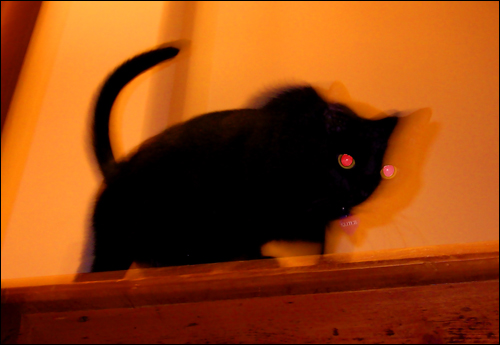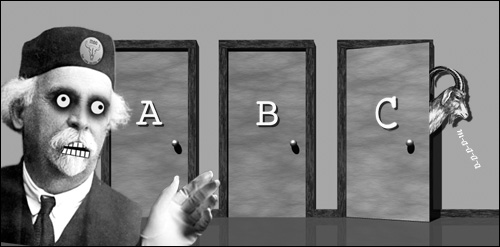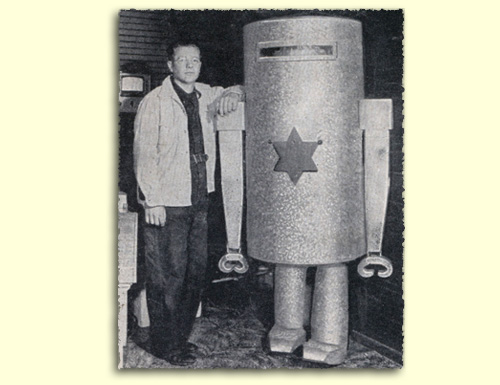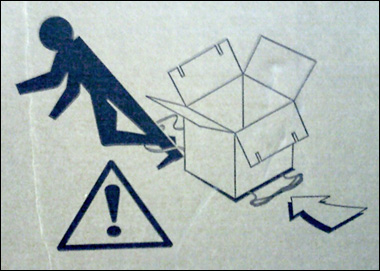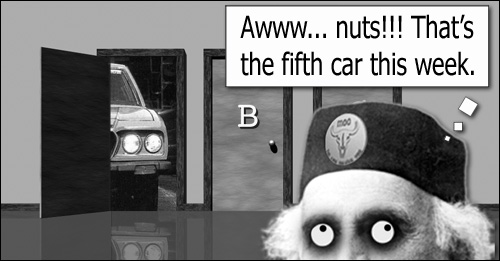
The correct answer to The Monty Hall Problem is: Yes, you should definitely change your choice when Monty gives you the opportunity. You will improve your odds of walking away with the car from your initial 33.3% to an impressive 66.6%.
Those of you who said that your chances remain the same as they were to start with, or improve to an even 50/50, are in error. I know, it seems bizarre on the face of it: if you change your mind, your chances of winning the car are not just better, but substantially better. But how can that possibly be?
I think the best way to approach the Monty Hall Problem is like this:
First of all, remember that Monty knows what’s behind every door. This is critical.
When you make your initial random choice from Doors A,B & C, there is a 2-in-3 chance that you will pick a goat. That is, two times out of every three your first random choice would give you a goat. Are we agreed on that point? Good. Therefore, on those two times out of every three, after Monty knows your choice, he will have no option but to open the door where the other goat is (presuming, of course, that he doesn’t want to show you the door with the car). Logically, therefore, Monty Hall allows you to know two thirds of the time where the car is† (that is, behind the door you didn’t choose). So you should always change your choice when he gives you the opportunity to do so.
It’s infuriatingly counter-intuitive. When I was first presented with the Monty Hall Problem I was convinced the choice was a mere 1/2 and therefore it made no difference if I changed or not. But the maths don’t lie. If the Word of the Cow isn’t good enough for you, go to the maths department at the University of California & San Diego and conduct yourself some practical trials. If you always change your choice when given the opportunity you will walk away with the car more often than not. You can also see the accumulated trials of everyone who has done the experiment before you: it’s inarguable – the best strategy is to swap doors when Monty gives you the choice!
Why do we have such difficulty with the Monty Hall Problem? I think the answer is twofold – firstly our brains are not naturally great at interpreting statistics, and secondly, The Monty Hall Problem is not strictly a problem of maths.
Statistically we can all see quite clearly that the chance of choosing the car initially is 1-in-3. We then tend to think that by being shown an ‘irrelevant’ door and given two remaining options there is an equal chance that either may hide the prize. This is in fact true; in a strict statistical sense, taken in isolation, the prize may indeed be behind either remaining door. But Monty (unwittingly, we must suppose) is not giving you that kind of choice. He is instead giving you the opportunity to change your mind about your first choice which is an entirely different thing altogether. And that opportunity is informed by the fact that Monty knows something about what’s behind the doors that you don’t.
In other words, a purely statistical experiment is muddied up by the fact that the experimenter knows something about the outcome and stirs that into the experiment, irrevocably removing the random element.
Or, put another way, if Monty doesn’t know what’s behind each of the doors (or, alternately, if you don’t tell Monty which door you’ve initially chosen) then the Monty Hall Show plays out exactly as your intuition might suggest. (Of course, if Monty doesn’t know what’s behind the doors, in all possibility he may reveal the car when he opens a (necessarily) random door to show you what’s behind it, immediately increasing your odds of walking away with the prize to 100%).
The Monty Hall Problem is a good reminder of how easily it is for the human brain to be lead astray, and why our intuitive grasp of things is not a reliable indicator of the way they really are…
___________________________________________________________________________
†Of course, on the one-in-three times you choose the car on your first go, Monty can show you either of two doors with a goat, in which case your chance of getting the car if you swap doors is merely 50/50. But that’s only for one out of every three times you randomly choose correctly on the first pick!
Correction courtesy of din.
___________________________________________________________________________
